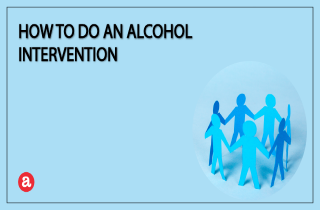What to expect from an alcohol intervention
It’s sometimes difficult to know what to expect from an alcohol addiction intervention, since every alcoholic will react differently. The main goals of an alcohol intervention, however, are to help the alcoholic stop drinking and seek treatment for their alcoholic addiction.
The actual outcome of an alcohol intervention, though, can go two ways. An alcoholic will either go into treatment and quit drinking, or refuse to go into treatment. If the latter happens, loved ones should consider seeking therapy or support groups for themselves. This will help them to better understand alcohol addiction in general, equip them to deal with an alcoholic, and help them understand that they aren’t alone.
Alcohol intervention steps
1. In general, an alcohol intervention should not be attempted without the guidance of a trained professional. Therefore, the first step of an alcohol intervention should be meeting with an intervention specialist. This professional can help individuals understand the alcohol intervention steps that they need to take, and help them through the actual intervention itself.
2. Planning is one of the most important alcohol intervention steps, and it should never be skipped. While planning an alcohol intervention, the following are discussed:
- the group of individuals who will participate in the intervention
- the time and place for the intervention
- what to expect during the intervention
- how to deliver your message
Members of the group should also plan what they will say during the alcohol intervention as well as what the consequences will be if the alcoholic refuses to quit drinking.
3. The most obvious of all alcohol intervention steps would be the actual intervention itself. During an intervention, an alcoholic is confronted in a loving and respected manner about his or her drinking. The members of the confronting group will typically cite specific facts that prove that an alcoholic has a problem. They will then give the alcoholic a choice between quitting drinking or losing their support or enabling behavior.
Planning an alcohol intervention
An alcohol intervention is more of a process rather than a simple one-time event, and it should be planned meticulously. When planning an alcohol intervention, meeting with an alcohol interventionist is highly recommended so that you can get feedback on best practices. Intervention specialists can help loved ones plan and carry out an alcohol intervention.
During the planning stage, a group of loved ones meet with an intervention specialist in order to understand the process and learn what to say and how to say it. When planning an intervention, the group of loved ones should decide on a time and place for the intervention, and plan what to say. They should also decide on what to do if the alcoholic will not quit drinking. Some consequences in this case can include removing financial and emotional support. Loved ones must realize and be ready to accept that they must put an end to their enabling behavior if they want the alcoholic to quit drinking.
Does an alcohol intervention work?
The answer to the question “Does an alcohol intervention work?” is not always as straightforward as it should be. The simple answer is sometimes it does and sometimes it doesn’t. Whether it works or not will typically depend on a number of factors. So, how can you know what to expect from an intervention?
For an alcohol intervention to work, it must be planned and executed properly. This is why the help of an intervention specialist is so important. If an alcoholic is feeling that he or she is simply being attack and ganged up on, then they are less likely to want to seek treatment.
Also, and oftentimes most importantly, the alcoholic must be ready and willing to enter treatment. If they aren’t, then there’s a good chance that an alcohol intervention won’t work. In this case, loved ones should follow through with the consequences that they laid out during the intervention, such as removing emotional or financial support.
An intervention that ends in an alcoholic refusing treatment, however, does not always indicate failure. After a cooling off period, an alcoholic may realize that their loved ones have their best interests at heart and seek treatment on their own. If they don’t additional interventions may be needed down the road.
Alcohol intervention questions
An alcohol intervention is a stressful process for everyone involved, and it’s natural to have questions or concerns about it. It’s also very important to learn everything you can about alcohol interventions before attempting them. If your loved one is an alcoholic and you have any alcohol intervention questions, feel free to leave them in the comments section below. We strive to provide our readers with as much information and support as they need during these difficult times in their lives.









Related Posts